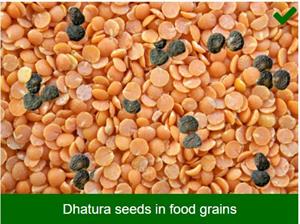
PUMPA - SMART LEARNING
எங்கள் ஆசிரியர்களுடன் 1-ஆன்-1 ஆலோசனை நேரத்தைப் பெறுங்கள். டாப்பர் ஆவதற்கு நாங்கள் பயிற்சி அளிப்போம்
Book Free DemoObserve the picture below and note the black coloured seeds present.

The black coloured dhatura seeds are mixed with masoor dal. The addition of dhatura seeds with the dal is called adulteration. Dhatura seeds are called adulterant.
Adulteration is the addition or subtraction of a substance to or from food so that the natural composition and the quality of the food substance is affected.
Example:
Addition of water to milk, sugar solution to honey, saw dust to tea powder, tamarind powder to coffee powder.
Adulterant is any material that is used for the purpose of adulteration.
Food adulteration is a very common practice in our country that has harmful effects on the health. Adulteration of foods has varied effects on individuals as well as on community health.
Some commonly adulterated foods include milk and milk products, honey, cereals, pulses, coffee powder, tea powder, turmeric powder, saffron, confectionery, non-alcoholic beverages, spices, edible oils, meat, poultry products etc.
Reasons for food adulteration:
- To earn greater profits.
- To increase the weight or bulk of the food product.
- When the supply is less than that of the demand.
- To cut down the product costs to meet the competition of the market.
- Shortage of authentic ingredients at affordable prices.
- Inadequate knowledge of consequences that are associated with food safety risks.
- Lack of proper food safety laws.
The adulterants in food are classified into three categories:
1. Natural adulterants
2. Incidental / unintentionally added adulterants
3. Intentionally added adulterants
Natural adulterants:
Natural adulterants are the chemicals or organic compounds that are naturally present in food.
1. Toxic substances in certain poisonous mushrooms
2. Prussic acid, also known as cyanide in the seeds of apples and cherry that are poisonous
3. Marine toxins
4. Fish oil poisoning and
5. Environmental contaminants like the water and soil pollutants
Incidental/unintentionally added adulterants:
Adulterants added unknowingly due to ignorance, carelessness, or improper facilities during food handling and packaging. It includes:
1. Pesticide residues like dichloro-diphenyl-trichloro-ethane (DDT).
2. Droppings and bodily secretions of rodents and insects, rodent bites, and larva in food during its storage.

3. Microbial contamination that is caused due to the presence of pathogens like Escherichia coli, and Salmonella in fruits, vegetables, ready-to-eat (RTE) meat and poultry products
4. Tin leached from cans
5. Metallic contamination with arsenic, lead, and mercury.
Intentionally added adulterants:
These adulterants are added intentionally for financial gain and have a serious impact on the consumer's health. The adulteration involves the deliberate addition of inferior materials. These types of adulterants include:
1. Additives and preservatives like vinegar, sodium bicarbonate (baking soda), citric acid, hydrogen peroxide and detergents in milk, modified food starch, synthetic preservatives, food flavours, and artificial sweeteners.
2. Chemicals like calcium carbide to artificially ripen bananas and mangoes.

3. Non-certified food colours that contains chemicals like metallic lead. These food colours are used to give colours to vegetables like green leafy vegetables, bitter gourd, green peas etc. These colours give a fresh look to the vegetables.
4. Edible synthetic wax-like shellac or carnauba wax is coated on fruits like apple, pear to give a shiny appearance.

Wax coated apple
5. Sand, marble chips, chalk powder, water, and mineral oil added to the foods.
6. Oxytocin is injected in radish and other vegetables to make it bigger in size. Below is a video where various adulterants are added to the vegetables to make it more appealing and to increase the profit for farmers.
Injecting oxytocin to tomato
Health Effects of Adulterated Foods
Consumption of these adulterated foods can lead to serious health effects like:- Fever
- Diarrhoea
- Nausea
- Vomiting
- Gastrointestinal disorders
- Asthma
- Allergy
- Neurological disorder
- Skin allergies
- Immune suppression
- Kidney and liver failure
- Colon cancer and even birth defects.
Important!
World Food Day is celebrated on the 16th of October. World Food Day is celebrated to create awareness on food safety and to avoid the wastage of food.
The day is celebrated to celebrate the founding date of the Food and Agricultural Organization (FAO) of the United Nations in the year 1945. World Food Day is celebrated to increase the awareness of hunger in the world.